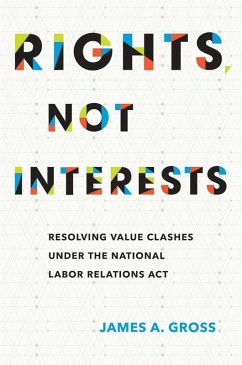This provocative book by the leading historian of the National Labor Relations Board offers a reexamination of the NLRB and the National Labor Relations Act (NLRA) by applying internationally accepted human rights principles as standards for judgment. These new standards challenge every orthodoxy in U.S. labor law and labor relations. James A. Gross argues that the NLRA was and remains at its core a workers' rights statute.
Gross shows how value clashes and choices between those who interpret the NLRA as a workers' rights statute and those who contend that the NLRA seeks only a "balance" between the economic interests of labor and management have been major influences in the evolution of the board and the law. Gross contends, contrary to many who would write its obituary, that the NLRA is not dead. Instead he concludes with a call for visionary thinking, which would include, for example, considering the U.S. Constitution as a source of workers' rights. Rights, Not Interests will appeal to labor activists and those who are trying to reform our labor laws as well as scholars and students of management, human resources, and industrial relations.
Gross shows how value clashes and choices between those who interpret the NLRA as a workers' rights statute and those who contend that the NLRA seeks only a "balance" between the economic interests of labor and management have been major influences in the evolution of the board and the law. Gross contends, contrary to many who would write its obituary, that the NLRA is not dead. Instead he concludes with a call for visionary thinking, which would include, for example, considering the U.S. Constitution as a source of workers' rights. Rights, Not Interests will appeal to labor activists and those who are trying to reform our labor laws as well as scholars and students of management, human resources, and industrial relations.
Dieser Download kann aus rechtlichen Gründen nur mit Rechnungsadresse in A, D ausgeliefert werden.


